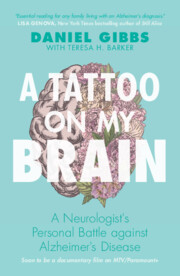Book contents
- A Tattoo on My Brain
- Reviews
- A Tattoo on My Brain
- Copyright page
- Dedication
- Contents
- Acknowledgments
- Introduction
- Prologue
- 1 Beacon Rock
- 2 Forewarned and Forearmed
- 3 The Smell of Baking Bread
- 4 Sneak Preview
- 5 A Stubborn Puzzle
- 6 The Locked Box and the Family Tree
- 7 The Measure of Memory
- 8 Orcas Nonetheless
- 9 My Brain, My Self
- 10 The Reveal
- 11 Cognitive Reserve and Resiliency: Brain Cells in the Bank
- 12 My Experimental Life
- 13 When ARIA Is More than an Operatic Solo
- 14 My Experiential Life: Living with Early-Stage Alzheimer’s Disease
- 15 Madeleines, Music and African Doves
- 16 It’s Only Scary If You Look Down
- 17 Beyond DNA: Family History Reconsidered
- 18 News at 5: Retired Neurologist Battles Alzheimer’s
- 19 The Forest, the Trees and the Ground Beneath My Feet
- 20 What’s in a Name? Alzheimer’s Reimagined
- 21 A Meaningful Outcome
- Epilogue: The Writing Life
- Epilogue: The Writing Life, Act II
- Appendix:
- Resources
- Index
- References
16 - It’s Only Scary If You Look Down
Published online by Cambridge University Press: 12 November 2022
- A Tattoo on My Brain
- Reviews
- A Tattoo on My Brain
- Copyright page
- Dedication
- Contents
- Acknowledgments
- Introduction
- Prologue
- 1 Beacon Rock
- 2 Forewarned and Forearmed
- 3 The Smell of Baking Bread
- 4 Sneak Preview
- 5 A Stubborn Puzzle
- 6 The Locked Box and the Family Tree
- 7 The Measure of Memory
- 8 Orcas Nonetheless
- 9 My Brain, My Self
- 10 The Reveal
- 11 Cognitive Reserve and Resiliency: Brain Cells in the Bank
- 12 My Experimental Life
- 13 When ARIA Is More than an Operatic Solo
- 14 My Experiential Life: Living with Early-Stage Alzheimer’s Disease
- 15 Madeleines, Music and African Doves
- 16 It’s Only Scary If You Look Down
- 17 Beyond DNA: Family History Reconsidered
- 18 News at 5: Retired Neurologist Battles Alzheimer’s
- 19 The Forest, the Trees and the Ground Beneath My Feet
- 20 What’s in a Name? Alzheimer’s Reimagined
- 21 A Meaningful Outcome
- Epilogue: The Writing Life
- Epilogue: The Writing Life, Act II
- Appendix:
- Resources
- Index
- References
Summary
Very early in my career, long before the advent of donepezil (Aricept) and other medications for treating the cognitive symptoms of Alzheimer’s, a middle-aged woman came to see me for a second opinion.She had mild but troubling symptoms of cognitive impairment and had seen another neurologist who made a diagnosis of Alzheimer’s disease. She had already had all the appropriate testing to exclude treatable mimics of dementia, and those tests were normal. Cognitive testing had shown some very subtle impairment of verbal memory and visual–spatial processing.I told her that she might indeed have very early Alzheimer’s disease, but it was impossible for me to make that diagnosis with certainty. There were no tests to make a firm diagnosis of Alzheimer’s at that time, other than a post-mortem examination of brain tissue. A few months later, I learned that she had taken her own life.
- Type
- Chapter
- Information
- A Tattoo on my BrainA Neurologist's Personal Battle against Alzheimer's Disease, pp. 131 - 141Publisher: Cambridge University PressPrint publication year: 2023



